Jeffry Mindlin Diefendorf, an imaginative historian who excavated the ruins and illuminated the reconstruction of post–World War II Germany, died on March 23, 2024, in Dover, New Hampshire. He was 78 years old.

Photo courtesy University of New Hampshire
Born in Pasadena, California, Jeff grew up in Albuquerque, New Mexico, where he became a standout student and outdoors enthusiast. At Stanford University, his plans to study engineering began to go awry when his freshman adviser suggested he take German, the language best suited to an aspiring engineer. An early teaching assistant—James Sheehan, future distinguished historian of modern Germany and president of the AHA—turned Jeff’s attention to German history.
Jeff’s 1965 study abroad proved decisive, as he lived with a German family in the small town of Beutelsbach only 20 years after the war’s end. The experience nurtured in him “a deep and very personal interest in Germany’s present as well as its past,” his wife recalls. Jeff became fluent in German, made new and lasting friends, and acquired through travel and study a lifelong appreciation for European art, music, and culture.
After earning his BA from Stanford in 1967 “with great distinction” and honors in both history and humanities, Jeff undertook graduate work in German history at the University of California, Berkeley. His 1975 doctoral dissertation focused on the era of the French Revolution and became the basis of his first book, Businessmen and Politics in the Rhineland, 1789–1834 (Princeton Univ. Press, 1980). While at Berkeley, he met fellow graduate student and his future wife, Barbara (Boonstoppel), now an eminent historian of early modern France, in a seminar on the French Revolution.
Jeff accepted a position at the University of New Hampshire in 1976, where he advanced through the ranks from assistant professor to an endowed chair as the Pamela Shulman Professor of European and Holocaust Studies. A dedicated, highly skilled, and rigorous instructor, Jeff made lasting contributions to the teaching of history at the university. As an assistant professor, he introduced a course designed to teach skills in critical analysis and writing that remains a rite of passage for undergraduate history majors. Likewise, his required graduate seminar on historical methods became a memorable proving ground for generations of master’s and doctoral students. According to one student, the class was “the most challenging, invigorating, and helpful course” of their academic career.
The alchemy came from Jeff himself. He was, a doctoral student recalled, “an all-star professor who had a stake in the material and his students. He wrote copious, typed comments on each of my assignments and read my work carefully. He introduced us to the major changes in historiographical thinking over the years and allowed us to develop a research proposal that fit into them. Most importantly, he was a model of how to be a good professor . . . and helped me to understand that being a historian is not just a job, but rather a vocation. It’s a career, but it’s more importantly a way of thinking and being.”
An exacting department chair in the 1990s, Jeff played a major role in recruiting new history faculty during years “of unequaled growth,” his colleague Janet Polasky noted. His unswerving institutional loyalty led to service on numerous departmental and university committees and appointment as senior faculty fellow in the College of Liberal Arts.
Despite these commitments, Jeff’s scholarly work flourished. His acclaimed book, In the Wake of War: The Reconstruction of German Cities after World War II (Oxford Univ. Press, 1993), proved especially influential in deploying local sources to unmask environmental, architectural, legal, and political dimensions of West Germany’s massive reconstruction effort. Jeff demonstrated, fellow German historian Andrew Demshuk observed, how comparative local research could elucidate “big historical questions.” He skillfully edited seven wide-ranging volumes on the Holocaust, comparative postwar reconstruction, and environmental history. A planned comparative history of Cologne, Basel, and Boston was interrupted when Jeff was diagnosed in 2017 with primary progressive aphasia, the disease that ended his life.
“What can I say?” a former student responded when asked his impressions of Jeff upon his retirement in 2016. “An old-school intellectual powerhouse. Snappy dresser. Music lover. Oenophile.” All true and more. He would have enjoyed the epitaph.
Ellen Fitzpatrick
University of New Hampshire (emerita)
This work is licensed under a Creative Commons Attribution-NonCommercial-NoDerivatives 4.0 International License. Attribution must provide author name, article title, Perspectives on History, date of publication, and a link to this page. This license applies only to the article, not to text or images used here by permission.